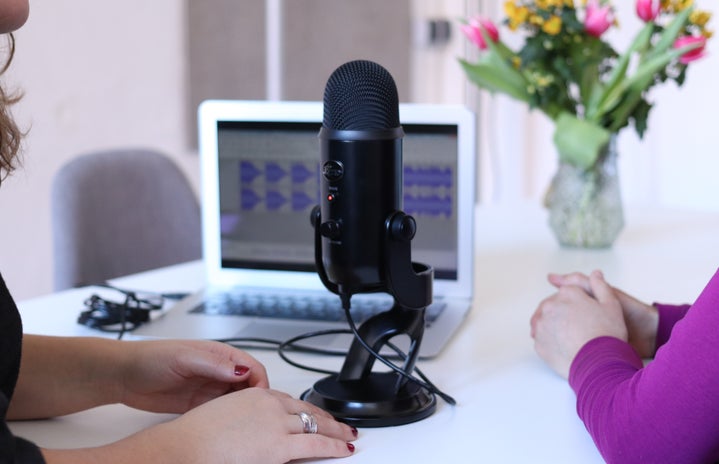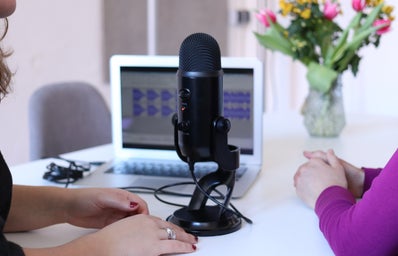On Saturday, 7th November, Her Campus St Andrews hosted a panel in conjunction with several other professional and student-based organisations to continue the conversation surrounding sexual assault and harassement at the university.
The panel was designed as a follow on to the conversation started this summer by the Instagram account St Andrews Survivors, a platform through which survivors of sexual assault could share their stories. As an online media publication written for college women by college women, we felt it necessary to address the issue, and contribute to a solution in the most productive way possible. Consequently, we arranged for nine qualified speakers to sit on the panel and discuss topics and questions submitted anonymously prior to the panel. Those nine speakers included representatives from St Andrews student-based organisations Got Consent, St Andrews Survivrors, and the Healing Collective, as well as professionals from Rape Crisis Scotland, FRASAC, FearFree and CLICK, and a Thompsons sollicitor who specializes in cases of sexual assault.
For a bit more background on our panelists – Got Consent is a student led initiative aiming to raise awareness about sexual misconduct, educate students on bystander intervention, and support survivors. St Andrews Survivors is an Instagram-based platform that publishes anonymous stories from sexual assault survivors at the university, and whose goal is to expose the reality of sexual abuse at St Andrews, as well as to empower survivors to share their stories. The Healing Collective is a student-based collaborative platform created for and by the survivors of sexual violence at St Andrews to foster healing, solidarity, and compassion. Of our professional panelists, Rape Crisis Scotland provides a national rape crisis helpline and email support for anyone affected by sexual violence, no matter when or how it happened. Additionally, Fife Rape and Sexual Assault Centre (FRASAC) is an independent voluntary organisation that offers free and confidential time-limited support to anyone, male or female, who has been raped or sexually assaulted at some point in their lives. FearFree focuses more closely on men and on LGBTI+ survivors who are often left out of the conversation, and acts as a support service for any man, or LGBTI+ person experiencing domestic abuse. Our final represented organization, CLICK, provides a forum for women involved in selling sex online to have a voice in developing and improving the support services around their health, safety and well-being.
The panel itself addressed a range of topics, from university and regional help resources to raising awareness about how trauma affects the body, and from how to support a survivor as a friend to how to talk to your family about your experience. For the benefit of those who were unable to join us last Saturday, Her Campus has compiled a recap of our key discussion topics.
1. What are some tangible help resources available for University students?
As they have been working on exactly this topic for years, Got Consent took the question, explaining that there are two specific avenues for practical support that we now know of through the University that we feel may be useful for survivors to be aware of. First there are Risk Assessments: you can get a risk assessment completed by the Disciplinary Team without having to make an official report. They will assess any immediate threats to the safety of you and the community and take action to eliminate or reduce these threats. Often this will include a no contact order so that the perpetrator is not allowed to contact you at all, and sometimes can result in a temporary suspension for the perpetrator. Secondly is tangible support that you can receive through Student Services without having to enter into any disciplinary processes. They can offer you counselling, but also more practical support such as providing emergency accommodation adjustments and helping you move, helping you apply for S-coding, getting your tutorial or lab groups changed, and other useful assistance you might be needing.
In terms of lists of resources, the university website is a really great starting point. The Healing Collective contributes to this list with their own student organised support groups, resources to connect survivors with therapists, as well as a summary on their website outlining the full process that goes into reporting sexual misconduct.
2. There seems to be heavy emphasis on female victims of sexual assault, while men and LGBTQ+ people frequently get left out of the conversation. What resources are available for non-female identifying victims, and how can this stigma be addressed?
Our speaker Angela Voulgari from FearFree chose to respond to this specific question, stating that the issue needs to be more widely discussed and destigmatized so that conversations such as these don’t come with the caveat of exclusion. The really damaging factor in their exclusion from the mainstream dialogue is a lack of education, which means that men or LGBTI+ people are often made to feel abnormal. This should not be the case. All survivor victims should be treated with equal respect, equal care, and equal attention, regardless of gender, sexuality, class, race, or any other discriminatory characteristics. In terms of available resources, there is a helpline specifically designed for male survivors called Survivors UK, and the Switchboard helpline caters to LGBTI+ survivors. In addition, FearFree offers non-judgmental, one-to-one support for individuals experiencing domestic abuse. The Healing Collective also has done, and continues to do, thorough research into the area, and has found that men respond to support better when in mixed support groups. As such, they have created a support group that is open to all gender identities, so as to more effectively help male and male-identifying victims.
3. How to talk to your family about your sexual assault
The key element to this question that our panelists pointed out that it is fundamentally deeply personal. Firstly and most critically, Matthew from The Healing Collective emphasized that “you do not owe any explanation, nor do you have any obligation to open up to your family if it is not something that you are comfortable with doing. You have control over your story andc you do not owe it to anyone to change that.” This message is especially important for men or LGBTI+ survivor victims, as it is sometimes the case that families from different cultural backgrounds may react in ways that are damaging for the victim. Keep this in mind and make sure that you are comfortable and in a safe space if you have chosen to open up to family members.
If you do decide to talk to your family about it, here are a few things that St Andrews Survivors recommends. “Telling your family you’ve been sexually assaulted can be one of the most difficult things to do. Unfortunately, there is often no easy way to do it, but there are a few things you can do to make it a little easier. The first thing is to prepare them; let them know that you need to discuss something serious, and make sure you have plenty of time so it isn’t rushed at all. You might want to have this conversation in a private space where you feel comfortable and can easily step out if you need a breather at any point. Before you tell them, it can also be helpful to set some boundaries. For example, you could say at the start that you just want them to listen, and don’t feel ready to answer questions about it. You may find it comforting to have support on hand; this could either be someone in the room with you, waiting nearby, or able to answer a call or message at any time. Tell your story in as much or little detail as you feel comfortable with. It may feel too much to say everything at once, so you could start by just saying you were sexually assaulted and have another discussion about it at a later time. After you tell them, they may feel helpless or make assumptions about what is helpful to you. You may want to take time beforehand to consider what, if anything, you need or want from them to support you. This could include helping you think through your options, helping you manage your mental health, or even just listening to you. When you’ve finished telling your family member what has happened, telling them the best way to support you can help them understand what you need, and where to go from there.”
4. What are some small things that victims of trauma can do in their everyday lives to help them try and function at a more “normal” level?
One thing that all panelists agreed upon instantly is a distinct lack of information and understanding surrounding the ways that trauma affects the body. The instance of sexual assault, harrassment, or rape is fundamentally horrific and traumatic to the body and therefore, any response that your body adopts is completely normal, whether this is an adrenaline response, trust issues, insomnia, weight gain/loss, etc. These are all normal bodily and emotional responses to trauma, and this is fundamentally important when starting to function at a more “normal” level.
St Andrews Survivors notes that there are endless coping mechanisms out there, and each survivor will find different things that are helpful to them in their own situation and healing process. “One thing we will note is that it may be helpful to see a counselor, because they will know your situation and can suggest some coping mechanisms that will be specifically helpful to you.” That aside, here are a few small day-to-day things that have helped members of St Andrews Survivors:
- Grounding exercises: take a moment each day to engage all your senses and ground yourself when you feel normal – this can then help when you feel anxious or have a trigger.
- Keep an essential oil with you that you can associate with safety. Use it in public when feeling anxious or triggered. Some essential oils are specific to help with anxiety and stress
- A weighted blanket to help you sleep. These are blankets that have between 5 and 30 pounds of weight in them. They have been shown to reduce anxiety and help with insomnia.
- If you are feeling emotional, try to find a place to let out those feelings. Tears from emotional crying contain higher levels of stress hormones such as cortisol, so don’t hold it in. This can help you to feel better and get on with your day.
- Acknowledge and try to accept any new fears or anxieties you may now be dealing with, and seek solutions that will help ease them. For example, if you feel unsafe walking by yourself, keep a panic alarm button on you or download an app that will check in with you every so often and automatically call or message an emergency contact if you don’t confirm you’re okay.
5. As a friend, how can I best support a victim of sexual violence?
Firstly, our FRASAC speaker emphasized that you need to “let them know that their responses are normal and ok, and are your body’s ways of coping with trauma.” You are still here for them and still their friend, and you need to make sure that they know this. It is important to anchor them. “Providing that anchoring experience for someone is so important to let them know that not only will you always be there for them, you will be there to make them feel comfortable and safe and normal.” Furthermore, FRASAC advises for friends to be educated on the various ways that it can affect the body and the mind – weight gain, developing disabilities, trust issues, etc. However, an important distinction is that “as a friend or as an ally, it is not your job to be the therapist because it could be damaging for you, for them, and also, you are not qualified and do not have the skills. Ask how you can support them if they wanted to maybe see a therapist”. Lastly, it is crucial to always take their situation seriously, regardless of the extent or level of assault.
This guide from Rape Crisis Scotland is really helpful in providing a thorough catalog of the ways in which to support a friend. St Andrews Survivors contributes to this guide by listing a couple small ways to make a difference.
- Just listen to them – often they need to get it out, and they deserve the space to express and explain everything in the way they want to
- Tell them you believe them – sadly, this is something many survivors need to hear because they may have been disbelieved in the past or they are struggling with fears of being labelled “over dramatic” or a “troublemaker.” Hearing this affirmation from a friend can be very validating and comforting for them.
- Cut off their perpetrator – Don’t continue to be friends with their perpetrator if you were previously, and don’t bring that person up at all in conversation. Seeing your friends stay friendly with your abuser can be one of the most hurtful things as a survivor. Show them that you believe them beyond your words and use your actions.
- Check in with them to see if they are okay – Going out of your way to message them and ask how they are doing means a lot. They may not always want to talk about it, but most of the time it can’t hurt to just send a message checking in, and give them that opportunity to talk about how they’re doing if they want to. They will most likely just feel seen and supported to know you care.
- Don’t ask too many questions – Going into detail about their assault could be very triggering, retraumatizing, or painful for your friend. Never put them in a situation where they feel they have to do this; just let them share as much as they are comfortable with, and try to make sure they know you don’t expect anything more from them.
- Avoid phrases that could cause them to blame themselves more – Many survivors struggle with feelings of self-doubt and self-blame. Be extra careful not to question things like their reactions in the moment, why they acted a certain way or didn’t fight back, or decided not to report.
- Always take it seriously regardless of the “level” of sexual assault – Don’t make assumptions about the importance of a survivor’s experience based on how “bad” you think it was compared to other stories of sexual violence. All types of sexual violence have the power to traumatise and impact people in severe ways. Whatever happened to your friend, it has affected them enough to feel the need to tell you.
- Respect their boundaries – Be respectful of what your friend feels comfortable talking about; never push them to talk to you about what happened, how they’re feeling, or what they’re doing to cope.
- Don’t tell them what to do – Never insist or impose your personal judgment about what course of action is the ‘best’ or the ‘right’ thing to do. Instead, if you want to help them find solutions, listen to them, ask what they feel they need, and help them research options to find what’s best for them. Never judge them for not taking certain actions, like reporting or receiving counseling, because you can never fully understand what’s going on in their head and what might be preventing them from taking those certain steps.
6. How does education play a role in issues of sexual violence, and what would you like to see changed in schools and universities?
Sexual assault and rape are often extremely stigmatised topics, and as a result the general public ends up not knowing very much about it. Collectively, our speaks felt that it would be extremely beneficial if a baseline level of knowledge about these topics was taught in schools; this would help to destigmatise conversations around sexual violence and prepare young people much better for the rest of their lives. Two topics that St Andrews Survivors believe merit incorporation into school curricula in addition to consent education are lessons on rape culture and bystander intervention. Schools should teach students about the everyday manifestations of rape culture, so that they can be more aware of its presence in their own lives, and they should teach students how to be less complicit in this culture. Part of this necessarily includes bystander intervention; once students understand how to recognise inappropriate and harmful behaviour, schools should provide them with the tools they need to call out this behaviour when they see it.
In addition to preventative education on consent, rape culture, and bystander intervention, we would love to see more education, both in schools and in higher education, about empathising with and supporting survivors. One of the biggest trends throughout all St Andrews Survivors’ submissions has been dissatisfaction with friends and peers, such as survivors not being believed, seeing their friends remain on friendly terms with their perpetrators, having their experience turned into a joke or a scandalous rumor, and hearing their abuser’s behaviour dismissed and excused as “just what they’re like” or “just how they act when they’re drunk.” In England and Wales, approximately 20% of women and 4% of men have experienced sexual assault, so statistically speaking, most people will have at least one survivor in their social network. Educational institutions have the opportunity to prepare young people to treat the people around them with the empathy and respect they deserve, and perhaps send students off into the world having enough understanding about the impact of sexual trauma to produce a society in which survivors do not have to feel so alone.



